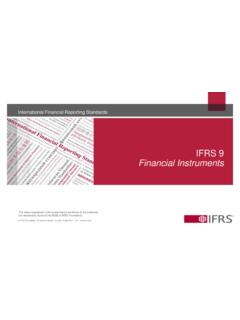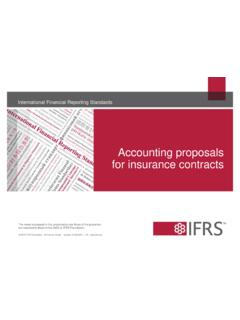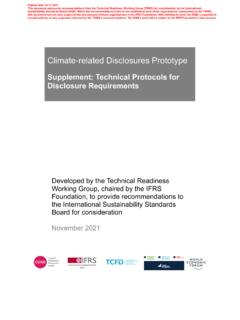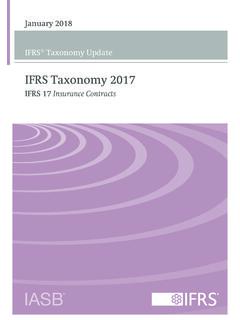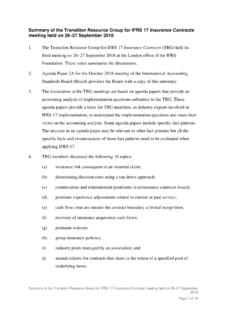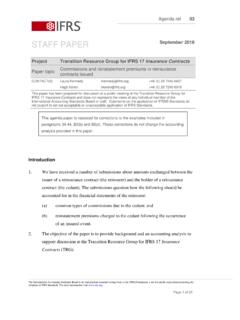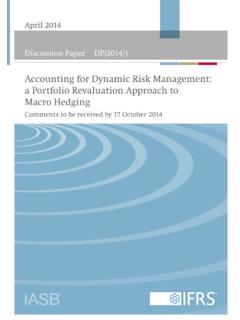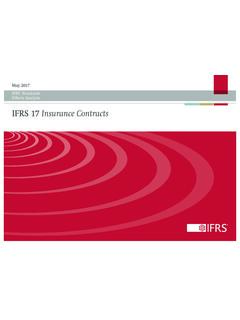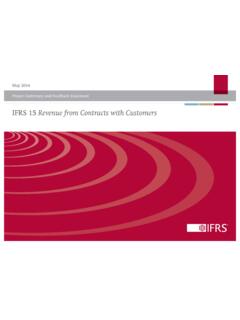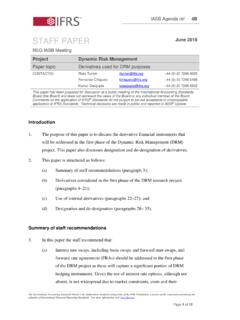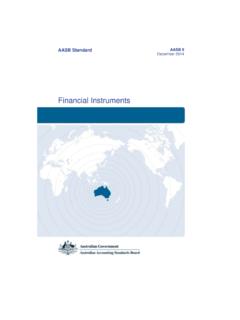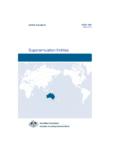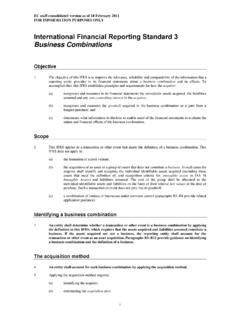Transcription of IFRS APPLICATION AROUND THE WORLD …
1 Copyright ifrs Foundation 1 ifrs APPLICATION AROUND THE WORLD JURISDICTIONAL PROFILE: Australia Disclaimer: The information in this Profile is for general guidance only and may change from time to time. You should not act on the information in this Profile, and you should obtain specific professional advice to help you in making any decisions or in taking any action. If you believe that the information has changed or is incorrect, please contact us at This Profile provides information about the APPLICATION of ifrs standards in Australia. ifrs standards are developed and issued in the public interest by the International accounting standards board (the board ). The board is the standard-setting body of the ifrs Foundation, an independent, private sector, not-for-profit organisation.
2 This Profile has been prepared by the ifrs Foundation based on information from various sources. The starting point was the answers provided by standard-setting and other relevant bodies in response to surveys that the Foundation conducted on the APPLICATION of ifrs standards AROUND the WORLD . The Foundation drafted the profile and invited the respondents to the survey and others (including regulators and international audit firms) to review the drafts, and their comments are reflected. The purpose of the ifrs Foundation s Jurisdictional Profiles is to illustrate the extent of implementation of ifrs standards across the globe only. The Profiles do not reflect the intellectual property licensing status of ifrs standards within any given jurisdiction.
3 The ifrs standards are protected by copyright and are subject to different licensing arrangements according to jurisdiction. For further information, please contact Profile last updated: 23 June 2017 RELEVANT JURISDICTIONAL AUTHORITY Organisation australian accounting standards board (AASB) Role of the organisation The AASB is an australian Government agency under the australian Securities and Investments Commission Act 2001. Under that Act, the statutory functions of the AASB are: to develop a conceptual framework for the purpose of evaluating proposed standards ; to make accounting standards under section 334 of the Corporations Act 2001; to formulate accounting standards for other purposes; to participate in and contribute to the development of a single set of accounting standards for worldwide use; and to advance and promote the main objects of Part 12 of the ASIC Act, which include reducing the cost of capital, enabling australian entities to compete effectively overseas and maintaining investor confidence in the australian economy.
4 australian accounting standards apply to: entities required by the Corporations Act 2001 to prepare financial reports; governments in preparing financial statements for the whole of government and the General Government Sector (GGS); and entities in the private or public for-profit or not-for-profit sectors that are reporting entities (as defined by australian accounting standards ) or that prepare general purpose financial statements. Copyright ifrs Foundation 2 Website Email contact COMMITMENT TO GLOBAL FINANCIAL REPORTING standards Has the jurisdiction made a public commitment in support of moving towards a single set of high quality global accounting standards ? Yes. Has the jurisdiction made a public commitment towards ifrs standards as that single set of high quality global accounting standards ?
5 Yes. What is the jurisdiction's status of adoption? Australia has already adopted ifrs standards for all companies (for-profit entities) that are Reporting Entities . This includes all companies whose securities are publicly traded plus others. Additional comments on the adoption status? Australia has adopted ifrs standards since 1 January 2005. However, convergence with standards issued by the board and its predecessor, the IASC board , had been occurring since 1996. Adoption from 2005 was through APPLICATION of ifrs 1 First-time Adoption of International Financial Reporting standards . Transitional disclosure requirements were specified in the year prior to adoption in AASB 1047 Disclosing the Impacts of Adopting australian Equivalents to International Financial Reporting standards .
6 When Australia initially adopted ifrs standards as of 2005, the AASB made a number of changes to ifrs standards , including elimination of accounting policy options and addition of disclosures. In 2007, the AASB approved an 'Amending Standard' that rescinded the changes that the AASB had made to ifrs when it initially adopted them as australian Equivalents of ifrs standards . Those amendments were effective 1 July 2007. However some additional disclosures still remain. Australia has two Tiers of reporting requirements for preparing general purpose financial statements: Tier 1: australian accounting standards ; and Tier 2: australian accounting standards Reduced Disclosure Requirements. ifrs are incorporated into Tier 1 of australian accounting standards , with the addition of paragraphs on the applicability of each Standard in the australian environment.
7 Tier 2 comprises the recognition, measurement and presentation requirements of Tier 1 (which are also the recognition, measurement and presentation requirements of ifrs standards ) and substantially reduced disclosures corresponding to those requirements. The following entities apply Tier 1 requirements in preparing general purpose financial statements: a. for-profit entities in the private sector that have public accountability (including pension funds); and b. the australian Government and State, Territory and Local Governments. The following entities may apply either Tier 2 or Tier 1 requirements in preparing general purpose financial statements: a. for-profit private sector entities that do not have public accountability; b.
8 All not-for-profit private sector entities; and c. public sector entities other than the australian Government and State, Territory and Local Governments. Private sector for-profit entities complying with Tier 1 of australian accounting standards will Copyright ifrs Foundation 3 simultaneously comply with ifrs standards . Those entities are required to have an explicit statement in the statutory financial statements regarding compliance with ifrs standards as issued by the board . March 2017 report on evaluation of ifrs standards in Australia In March 2017, the australian accounting standards board (AASB) published AASB Research Report No. 4, Review of Adoption of International Financial Reporting standards in Australia. The report found: The ifrs standards transition process has been reasonably smooth for most sectors.
9 While ifrs standards are currently an appropriate basis for AASB standards developed for NFP entities, further modifications are needed to improve the quality and the cost-efficiency of financial reporting. One of the key benefits of adoption across all sectors is that it has enabled users and preparers to move between sectors, and between countries, with transferable knowledge and skills. Some entities, in particular those that operate in other countries that use ifrs standards , have experienced cost savings in preparing financial reports. In contrast, some small and medium-sized entities (SMEs) and NFP entities have concerns regarding the costs of fully complying with AASB standards , particularly the disclosure requirements.
10 If the jurisdiction has NOT made a public statement supporting the move towards a single set of accounting standards and/or towards ifrs standards as that set of standards , explain the jurisdiction's general position towards the adoption of ifrs standards in the jurisdiction. Not applicable. EXTENT OF ifrs APPLICATION For DOMESTIC companies whose debt or equity securities trade in a public market in the jurisdiction: Are all or some domestic companies whose securities trade in a public market either required or permitted to use ifrs standards in their consolidated financial statements? Yes. If YES, are ifrs standards REQUIRED or PERMITTED? Required. Does that apply to ALL domestic companies whose securities trade in a public market, or only SOME?
